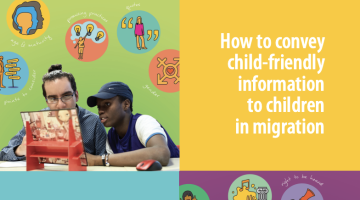Library
- Video -
Close to 190 countries are set to adopt the groundbreaking UN Global Compact for Safe, Orderly and Regular Migration. Among its many features, the Compact recognizes the contributions of migrants to the development of their host and origin countries. Migrant workers fill gaps in the labour market in...
SourceUnited Nations (UN)GCM Objectives
- Resource - Working Paper
The discussion paper reviews three types of migration, namely forced, labour and environmental migration. It then analyses its consequences for migrants, host and origin countries. It identifies the implications that these forms of migration have for different aspects of the Technical, Vocational...
SourceUnited Nations Educational, Scientific and Cultural Organization (UNESCO), University of NottinghamGCM Objectives
- Resource - Guidelines/Toolkits/Manuals
The guide aims to help skills decision-makers and practitioners assess to what extent their Technical, Vocational Education and Training (TVET) system is currently excluding certain individuals or groups, identifies underlying reasons, and provides practical ideas on what could be done to redress...
SourceInternational Labour Organization (ILO)GCM Objectives
- Resource - Policy Brief
This policy brief focuses on how mainstream Technical, Vocational Education and Training (TVET) and skills development systems can contribute to improving the labour market situation of migrant workers.
SourceInternational Labour Organization (ILO)
- Resource - Other
This book explores the realities, experiences and discourses of highly-skilled migrants, thereby examining the divides between those from the Global South and North.
SourceSpringer, International Migration Research Network (IMISCOE)
- Resource - Policy Brief
This report discusses the characteristics of Global Skill Partnerships, the timeliness of promoting their implementation and ten core lessons for successfully building such partnerships.
SourceCenter for Global Development (CGDEV)
- Resource - Platform / Website
The European Training Foundation is a European Union agency that helps transition and developing countries harness the potential of their human capital through the reform of education, training and labour market systems, and in the context of the EU's external relations policy.
SourceEuropean Training Foundation (ETF)GCM Objectives
- Resource - Platform / Website
The platform aims to respond systematically and effectively in supporting developing countries’ demand to connect, learn and collaborate with potential partners. It serves as a consolidated South-South solutions platform for Southern partners in the UN system and acts as a one-stop-shop for all...
SourceUnited Nations Office for South-South Cooperation (UNOSSC)
- Resource - Platform / Website
In order to respond to a growing-policy need for a common approach to promoting the inclusion of migrants and refugees that recognizes their contribution to development, UNITAR, together with some of its partners, has been working on different initiatives. These are aimed at strengthening the...
SourceUnited Nations Institute for Training and Research (UNITAR)
- Resource - Guidelines/Toolkits/Manuals
Este guía está diseñado a venezolanas y venezolanos en el contexto de la respuesta humanitaria de Brasil. Contiene informaciones prácticas sobre documentos y distintos tipos de derechos.
Only available in Spanish.
SourceInternational Organization for Migration (IOM), Government of Brazil
- Resource - Guidelines/Toolkits/Manuals
The aim of this guide is to assist those who provide assistance to migrants, refugees, victims of human trafficking and returned Brazilians, in a more practical and objective way, especially in the border area. Only available in Portuguese.
SourceInternational Centre for migration Policy Development (ICMPD)GCM Objectives
- Resource - Guidelines/Toolkits/Manuals
The Regional Guidelines provide concrete recommendations on how States can identify persons in need of international protection and how to link this identification made at the border with concrete protection measures available in each jurisdiction. In other words, they suggest practical ways to go...
SourceOffice of the United Nations High Commissioner for Refugees (UNHCR), United Nations (UN), Government of the Republic of Kazakhstan United Nations Country Team in Kyrgystan, United Nations Country Team in Turkmenistan, United Nations Country Team In TajikistanGCM Objectives
- Resource - Guidelines/Toolkits/Manuals
This handbook focuses on family reunification with children, including unaccompanied and separated refugee and migrant children in the member states of the Council of Europe.
SourceCouncil of Europe
- Resource - Guidelines/Toolkits/Manuals
The Guide, a product of a consultative process, outlines action undertaken by stakeholders in the referral and counter referral assistance route, giving due regard to the vulnerabilities of different migrant groups and aims to be used as tool in the processes of preliminary identification of...
SourceRegional Conference on Migration (RCM)GCM Objectives
- Resource - Report
Effective and efficient provision of information to migrants is decisive for migrants’ access to procedures, international protection and remedies but also for their future integration. However, qualitative data collected by the National Human Rights Institutions in Europe shows that there is still...
SourceEuropean Network of National Human Rights Institutions (ENNHRI)
- Resource - Guidelines/Toolkits/Manuals
These uniform Guidelines constitute a set of practical measures designed to enhance the identification of victims of human trafficking by front-line professionals engaged in migrant and refugee reception procedures in the OSCE region.
SourceOrganization for Security and Co-operation in Europe (OSCE)
- Resource - Guidelines/Toolkits/Manuals
Law-enforcement agencies, government offices, and non-governmental organizations often lack the expertise, experienced personnel, and sensitivity needed to deal effectively with the special needs of victims of trafficking. This handbook provides a political context, a methodology, and a description...
SourceOrganization for Security and Co-operation in Europe (OSCE), Office for Democratic Institutions and Human Rights (ODIHR)
- Resource - Guidelines/Toolkits/Manuals
This handbook has been developed to equip professionals and volunteers who interact with migrant and refugee children to communicate in a child-friendly way about their rights and the procedures affecting them.
SourceCouncil of Europe
Pagination
About the Migration Network Hub
What is the Migration Network Hub?
The Hub is a virtual “meeting space” where governments, stakeholders and experts can access and share migration-related information and services. It provides curated content, analysis and information on a variety of topics.
The Hub aims to support UN Member States in the implementation, follow-up and review of the Global Compact for Migration by serving as a repository of existing evidence, practices and initiatives, and facilitating access to knowledge sharing via online discussions, an expert database and demand-driven, tailor-made solutions (launching in 2021).
Submit your content
What content is displayed in the Hub?
The Hub aims to help you find information on migration, ranging from policy briefs and journal articles, existing portals and platforms and what they offer, to infographics and videos. The different types of resources submitted by users undergo peer review by a panel of experts from within the UN and beyond, before being approved for inclusion in the Hub. To provide guidance to users based on findings of the needs assessment, the content is ordered so that more comprehensive and global resources are shown before more specific and regional ones. Know a great resource? Please submit using the links above and your suggestion will be reviewed. Please see the draft criteria for existing practices here.
Apply to join the Peer Review Roster
Content submitted to the Migration Network Hub is first peer reviewed by experts in the field from both the UN and beyond. Applications are welcomed to join the roster on an ongoing basis. Learn more here.
Contact us
We welcome your feedback and suggestions, please contact us
*References to Kosovo shall be understood to be in the context of United Nations Security Council resolution 1244 (1999).
Newsletter
Subscribe to our newsletter.

